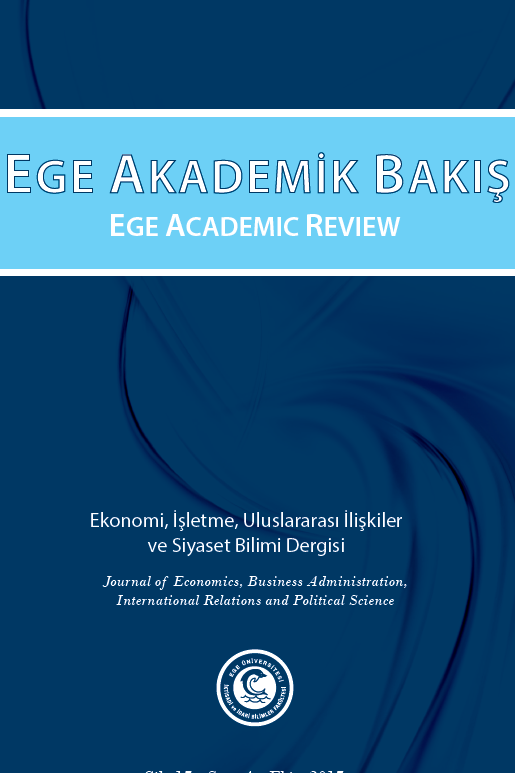Green Organizational Climate: Measurement Scale Development and Validation to Measure Green Climate Structure in Organizations
Green Organizational Climate: Measurement Scale Development and Validation to Measure Green Climate Structure in Organizations
This paper aimed to develop a valid and reliable measurement scale for green organizational climate. Both qualitative and quantitative research methodologies were applied. In the research, the three-stage scale development process proposed by Schwab (1980) was be used. The conceptual framework were first clarified and a proposal pool were created by compiling the expressions in scale through a qualitative exploration study, which includes literature review, in-depth interviews and focus group studies using deductive and inductive methods. Expert opinions were sought for the examination of face validity and content validity. After the pilot application, draft scale was applied to 750 managers of businesses operating in different sectors in various provinces of Turkey. According to the results of the exploratory factor analysis, 21 items and 4 dimensions were extracted, namely green economic climate, green social climate, green digital climate, and green bureaucratic climate. The results of confirmatory factor analysis indicated that the measurement items developed were had an acceptable level of compatibility. The cronbach alpha coefficients had sufficient reliability in all dimensions. As a result, it was seen that the green organizational climate scale is a valid and reliable measurement tool.
Keywords:
green organizational climate, green business, measurement scale, organizational behavior green climate structure,
___
- Brnova, Petra (2020). Strategic organizational sustainability climate: Scale development and validation. Doctoral Thesis, Nathan M. Bisk College of Business at Florida Institute of Technology, Department of Business Administration, Melbourne.
- Chou, Chia-Jung (2014). Hotels’ environmental policies and employee personal environmental beliefs: Interactions and outcomes. Tourism Management, 40 (2014), 436-446.
- Kuo, Szu-Yu and Pei-Chun Lin (2020). Determinants of green performance in container terminal operations: A lean management. Journal of Cleaner Production, 275(2020), 123105.
- Norton, Thomas A., Hannes Zacher and Neal M. Ashkanasy (2012). On the importance of pro-environmental organizational climate for employee green behavior. Industrial and Organizational Psychology: Perspectives on Science and Practice, 5, 497-500. doi:10.1111/j.1754-9434.2012.01487.x
- Norton, Thomas A., Hannes Zacher and Neal M. Ashkanasy (2014). Organisational sustainability policies and employee green behaviour: The mediating role of work climate perceptions. Journal of Environmental Psychology, 38, 49-54. doi:10.1016/j.jenvp.2013.12.008.
- Norton, Thomas A., Hannes Zacher and Neal M. Ashkanasy (2015). Pro-Environmental Organizational Culture and Climate. in: The Psychology of Green Organizations (ed. Jennifer L. Robertson, Julian Barling). Oxford University Press, 322-348.
- Norton, Thomas A., Hannes Zacher, Stacey L. Parker and Neal M. Ashkanasy (2017). Bridging the gap between green behavioral intentions and employee green behavior: The role of green psychological climate. Journal of Organizational Behavior, 38(7), 996-1015.
- Schwab, D. P. (1980). Construct Validity in Organizational Behavior. in: Research in Organizational Behavior. Cummings, L.L. and Staw, B.W. (Eds.). Greenwich CT.: JAI Press.
- Tsai, Hsu-Li, Chin-Shan Lu and Chih-Ching Chang (2017). The influence of organisational green climate on employees' green behaviours: Evidence from the Eco Port of Kaohsiung. International Journal of Shipping and Transport Logistics, 9(6), 696-723.
- Xiao, J., J.Y. Mao, S. Huang, T. Qing (2020). Employee-organization fit and voluntary green behavior: A cross-level model examining the role of perceived insider status and green organizational climate. International Journal of Environmental Research and Public Health, 2020(17), 1-18.
- ISSN: 1303-099X
- Yayın Aralığı: Yılda 4 Sayı
- Başlangıç: 2000
- Yayıncı: Ege Üniversitesi
Sayıdaki Diğer Makaleler
How do customers respond to digital banking products and services in New Zealand?
Onur ÜNLÜ, Senay YÜRÜR, Sevim GEZEGEN ÜNLÜ
CHANGE IN PUBLIC ADMINISTRATION: THE RELATIONSHIP BETWEEN DIGITAL AGE GOVERNANCE AND POSTMODERNISM
Dr. Öğr. Üyesi Serkan DORU, Burak YILDIRIM, Ahmet YAZAR
The Effects of Managers' Strategic Behaviors on Motivation at Workplace in a Chaotic Environment
